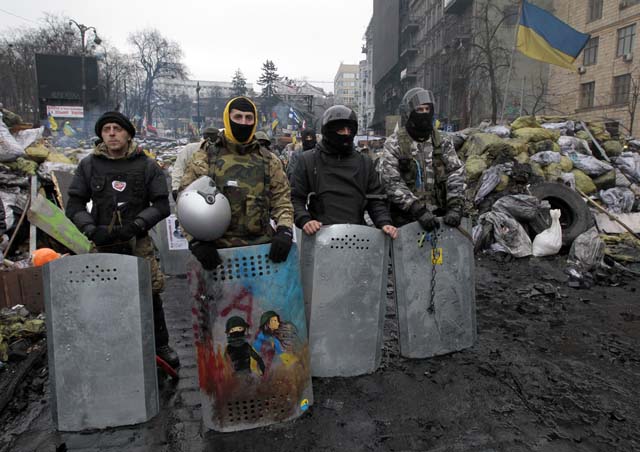KIEV — Ukrainian opposition protesters ended a two-month occupation of city hall in Kiev on Sunday and opened a road to limited traffic to meet an amnesty offer aimed at easing a stand-off over President Viktor Yanukovich’s rule.
The authorities, for their part, withdrew riot police from a flashpoint district of the capital, near the Dynamo Kiev football stadium, where at least three protesters died in January in violence between ultra-radical activists and police.
Despite the conciliatory moves, opposition leaders sought to keep up pressure on Yanukovich, telling a rally in Kiev’s Independence Square that he must abandon “dictatorial” powers and let them form a government that would be independent of him.
Tension still simmered before a parliament session on Tuesday when Yanukovich may present his candidate for prime minister — a choice that will show if he is ready to make more concessions to the opposition after 12 weeks of often ugly street confrontation.
Opposition leaders made it clear on Sunday they would also push at the parliament session for constitutional changes to reduce Yanukovich’s powers.
The unrest was sparked by Yanukovich in November when he spurned a free trade agreement long in the making with the European Union, and opted for a $15 billion package of Russian credits and cheaper gas to shore up Ukraine’s ailing economy.
The revolt spiralled into countrywide protests at perceived sleaze and corruption in the Yanukovich administration, and has triggered a geopolitical tussle between East and West.
As Russia beckons with the $15 billion aid package to plug holes in Ukraine’s heavily-indebted economy, the United States and its Western allies have urged Yanukovich to move back towards an IMF-backed deal with Europe.
At least six people have been killed and hundreds of people - police and protesters - wounded in the bloodshed.
As Sunday’s peaceful rally unfolded on Independence Square, attracting several thousand, young club-wielding masked men from the radical fringe of the protest movement who were on patrol, looking for government agents known locally as “titushki”.
A group of about 40 young men, wearing black balaclavas and carrying shields that announced they were from the 14th “self-defence” unit, marched through crowds gathered near the Dynamo Kiev football stadium, a frontline in the unrest.
On Saturday, at the other end of the city, several men who protested against barricades in the city emerged with bloodied faces after clashes with local “self-defence” units.
Western governments have expressed fears of an escalation of conflict, and breakdown of law and order unless Yanukovich meets opposition demands.
‘Front-line’ deal
All the same, tensions calmed at the Dynamo football stadium “front-line” with riot police leaving the streets, and protesters opening a passage for limited traffic to go through barricades to government headquarters and parliament.
On Sunday, former economy minister Arseny Yatseniuk repeated calls for constitutional changes that would strip Yanukovich of powers he has accumulated and enable an opposition government to be formed to lead the ex-Soviet republic to economic recovery.
After protesters departed Kiev’s City Hall, which they had occupied since early December, Yatseniuk called on Ukraine’s judicial authorities to live up to their amnesty promise and drop all criminal charges against protest activists.
Demonstrators had swept into the main municipal building as popular revolt took off against Yanukovich’s decision to ditch the EU trade pact in favour of a more immediately lucrative deal with Russia, Ukraine’s former Soviet master.
Under an amnesty arrangement, Ukrainian authorities have offered to drop all criminal charges against activists who have been provisionally freed as long as municipal buildings are cleared of protesters and some main roads unblocked by Monday.
“We want about 2,000 criminal cases to be dropped. If this does not happen, we will start a peaceful offensive,” Yatseniuk declared.
Switzerland, now chairman of the OSCE human rights watchdog, sent an envoy to Kiev to monitor the City Hall evacuation. Swiss Foreign Minister Didier Burkhalter said in a statement later: “I strongly hope this brings Ukraine closer to a resolution of the current deadlock through peaceful and democratic means.”
In Brussels, the EU’s foreign policy chief Catherine Ashton also welcomed the move, saying she expected the authorities now to close all pending court cases, including house arrests “so as to facilitate the political dialogue in parliament this week”.
Masked men
Masked men in military fatigues and the demonstrators they had protected against riot police since mid-December filed out of Kiev city hall but threatened to return if authorities did not carry out the amnesty promise.
Opposition deputies said protesters had similarly pulled out of municipal buildings in several areas of western Ukraine, a hotbed of opposition to Yanukovich, and in one part of the southeast where the president has retained more support.
Andriy, 45, commander of about 100 men in black balaclavas leaving City Hall, said they were doing so on the understanding that charges against detained activists would be dropped.
Asked what he and his men would do if the authorities did not fulfil their promise, he replied: “Then we’ll come back.”
A pivotal decision in coming days will be who Yanukovich names as his candidate for prime minister to replace the Russian-born Mykola Azarov, whom he sacked on January 28 in an unsuccessful attempt to appease the protesters.
He has until the end of the month to reach a decision although parliament speaker Volodymyr Rybak was quoted by Interfax as saying he thought Yanukovich might present his candidate to parliament on Tuesday.
His choice could decide more credit coming quickly on stream from Russia under the bailout package. But if he resists calls for constitutional change and names a hardliner, the streets could return to uproar. With the hryvnia under devaluation pressure, he has to find a new steward of the economy quickly.
